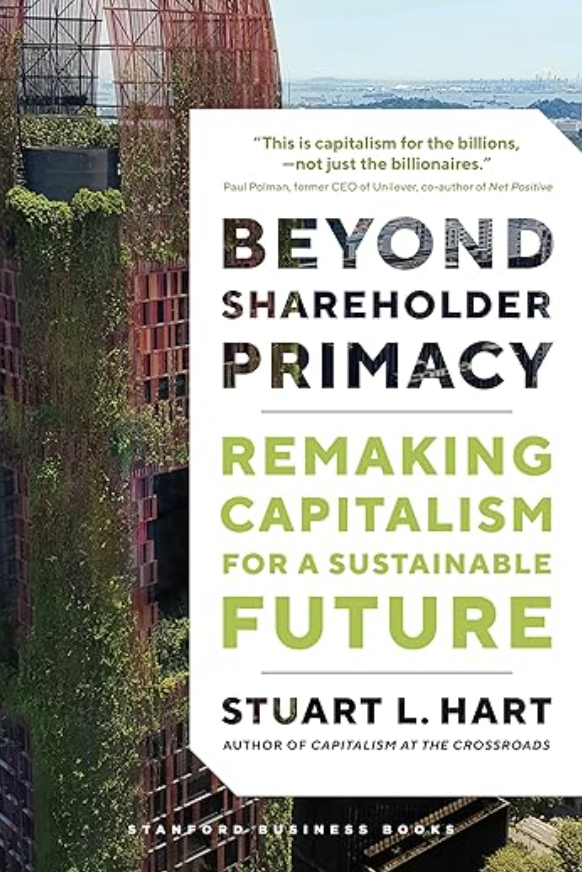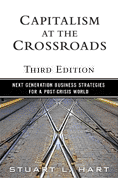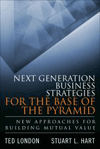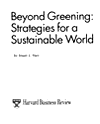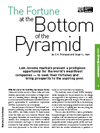Strategies for Sustainable Value

ABOUT
I'm Stuart L. Hart, a leading authority on the implications of environment and poverty for business strategy. A few years ago, I defined the concept of sustainable value; my work includes over 70 academic papers and several books.
My blog: Voice of the Planet >>
Learn more >>
BOOKS
My latest book, Beyond Shareholder Primacy: Remaking Capitalism for a Sustainable Future, published in 2024, is a call to consciousness―and action―for individuals, organizations, communities, and nations.
My best-selling book, Capitalism at the Crossroads, published in 2005, was selected by Cambridge University as one of the 50 top books on sustainability of all-time; the third edition of the book was published in 2010.
With Ted London, I'm the author of a newly released book entitled Next Generation Business Strategies for the Base of the Pyramid.
More books >>
ARTICLES
Beyond Greening: Strategies for a Sustainable World won the McKinsey Award for Best Article in the Harvard Business Review for 1997 and helped launch the movement for corporate sustainability.
With C.K. Prahalad, I wrote the pathbreaking article: The Fortune at the Bottom of the Pyramid which provided the first articulation of how business could profitably serve the needs of the four billion poor in the developing world.
The Great Leap: Driving Innovation from the Base of the Pyramid
By Stuart L. Hart and Clayton Christensen, Sloan Management Review
A Natural-Resource-Based View of the Firm
By Stuart L. Hart, Academy of Management Review
More articles >>
Sustainable Value
Over the past decade, Stuart Hart has developed, along with colleague Mark Milstein, a sustainable value framework that directly links the societal challenges of global sustainability to the creation of shareholder value by the firm.
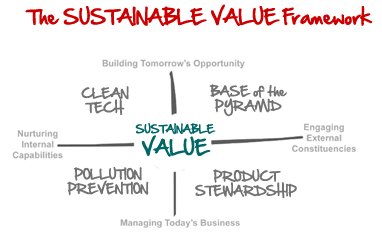
The framework shows how the global challenges associated with sustainability - viewed through the appropriate business lens - can help identify strategies and practices that contribute to a more sustainable world while simultaneously driving shareholder value. This "win-win" approach is defined as the creation of "sustainable value" by the firm.
There are four core dimensions of sustainability strategy with different linkages to firm performance and value creation:
- Pollution Prevention: minimizing waste and emissions from current facilities and operations;
- Product Stewardship: engaging stakeholders and managing the full life cycle of today’s products;
- Clean Technology: developing and deploying “next-generation” clean technologies; and
- Base of the Pyramid: co-creating new businesses to serve the unmet needs of the poor and underserved.
Taken together as a portfolio, these strategies and practices hold the potential to:
- reduce cost and risk (pollution prevention);
- enhance reputation and legitimacy (product stewardship);
- accelerate innovation and repositioning (clean technology); and
- crystallize growth path and trajectory (base of the pyramid)
— all of which are crucial to the creation of shareholder value. The challenge for the firm is to decide which actions and initiatives to pursue, and how best to manage them.
Companies can begin by taking stock of each component through what I call their sustainable value portfolio. This simple diagnostic tool can help any company or business determine whether its strategy has the potential to truly create sustainable value.
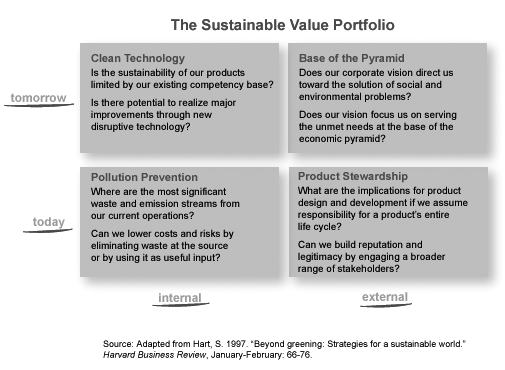
Programs in pollution prevention and product stewardship are well institutionalized within most corporations today, and have saved hundreds of millions of dollars over the past decade. US-based companies have been especially focused on the efficiency gains and cost savings associated with pollution prevention. Highly publicized crises — like those of Monsanto and Nike that failed to successfully engage the views of stakeholders — have also caused growing numbers of firms to explore strategies for product stewardship.
European companies have been particularly active in engaging in stakeholder dialogue, extending producer responsibility for products, and adopting more inclusive forms of corporate governance.
Research and consulting experience, however, suggests that few firms seem to recognize — let alone exploit — the full range of sustainable business opportunities available. Most companies focus their time and attention primarily on the bottom half of the matrix (short-term solutions tied to existing products and stakeholder groups). Focusing on incremental improvements to existing products and businesses is an important step, but it neglects the vast opportunities associated with clean technology, and the largely underserved markets at the base of the economic pyramid.
Indeed, addressing the full range of sustainability challenges can help to create shareholder value, and may represent one of the most under-appreciated avenues for profitable growth in the future.
(C) 2011 Stuart L. Hart. All Rights Reserved
Contact | Newsletter | Privacy
